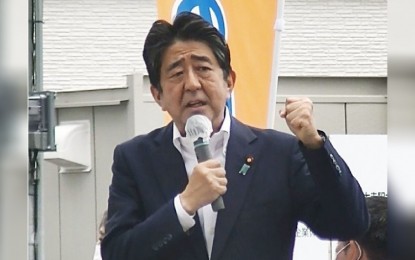
Former Japanese Prime Minister Shinzo Abe (Kyodo photo)
NARA, Japan – Former Japanese Prime Minister Shinzo Abe is dead after being shot on Friday while delivering a stump speech in the western city of Nara two days ahead of a national election, a ruling party source said.
Japan's longest-serving leader was attacked by a 41-year-old man from behind at around 11:30 a.m. when he was speaking in front of Kintetsu Railway's Yamato-Saidaiji Station, police said, adding he collapsed to the ground after two shots were heard. He was rushed to hospital with blood seen on his shirt.
Tetsuya Yamagami, a resident of Nara, was arrested at the scene on suspicion of attempted murder, the police said. The suspect was formerly a member of the Maritime Self-Defense Force, according to government sources.
"It's not a grudge against the political beliefs of former Prime Minister Abe," the Naha prefectural police quoted Yamagami as saying.
According to the disaster management agency, Abe, who was prime minister until 2020, was also wounded and bleeding on the right side of his neck with internal bleeding confirmed in the left side of his chest.
After returning to his office in Tokyo by helicopter from Yamagata Prefecture where he was campaigning, Prime Minister Fumio Kishida condemned the shooting of the 67-year-old former leader "in the strongest possible terms," saying such a barbaric act should never be tolerated.
The assailant's motive is not fully known, he said.
Abe, who was also the longtime leader of the ruling Liberal Democratic Party, was in the city to support a candidate running in Sunday's House of Councillors election and there was a crowd of people listening to his speech near the railway station when the attack occurred.
A Kyodo News reporter at the scene saw the attacker silently approach Abe, who had been speaking for several minutes, before shooting him.
Louds screams were heard from the crowd and Abe fell to the ground seconds later. Yamagami was immediately apprehended by police officers.
A campaign staff member was seen desperately trying to revive Abe by pushing on his chest with both hands as he lay on the ground with his eyes closed. People nearby called for medical assistance.
It is a rare case of a shooting in Japan, a country that has strict gun regulations.
The weapon used by Abe's assailant made a noise that could be compared to an explosion and white smoke rose into the air after it was discharged. A gunpowder-like smell could be detected afterward.
The weapon appeared to have its barrel wrapped with duct tape, the reporter said.
Kishida and his Cabinet ministers later discussed the government's response to the incident.
Asked about any impact on Japanese politics, Kishida said it was not the right time to think about it, adding nothing has been decided on how to respond to the remaining campaign period through Sunday.
Born into a prominent political family, Abe served as a secretary for his father, former Foreign Minister Shintaro Abe, before being elected to the House of Representatives in 1993.
He had a short stint as prime minister between 2006 and 2007 before assuming the post again in 2012. He stepped down due to health problems after nearly eight years.
During his second term as leader, he pursued economic policies dubbed "Abenomics" which were marked by massive monetary easing, fiscal stimulus and structural reforms aimed at beating deflation and turning the nation's stagnant economy around.
Abe made efforts to bolster Japan's security alliance with the United States and raise Japan's profile overseas, while seeking to promote reform of Japan's U.S.-drafted pacifist Constitution.
US Ambassador to Japan Rahm Emanuel said he is "saddened and shocked" by the shooting.
In 2014, the Abe administration went ahead with a reinterpretation of the Constitution to enable the use of collective self-defense -- defending allies even without an attack on Japan itself -- and expanded the role of the Self-Defense Forces under new security legislation in 2016.
The hawkish conservative sometimes drew the ire of Japan's Asian neighbors over wartime issues. In December 2013, Abe visited Tokyo's Yasukuni shrine, viewed as a symbol of Japan's past militarism, provoking a strong response, especially from China and South Korea. (Kyodo)
